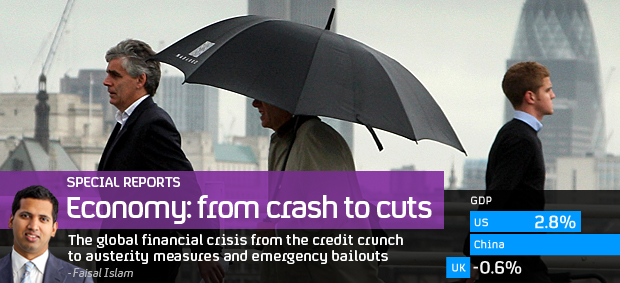Eurozone debt crisis crunch talks
 Siobhan Kennedy
Washington Correspondent
Siobhan Kennedy
Washington Correspondent
European leaders are holding emergency talks in Brussels to deal with the unfolding financial crisis. Chancellor George Osborne says the consequences could be dire if leaders fail to “get a grip”.
European Commission President Jose Manuel Barroso has called for decisive action at the crisis talks.
He said leaders must “do what it takes” to restore the credibility of the euro and halt contagion from Greece to other struggling member states, including Ireland, Portugal and Italy.
“Nobody should be under any illusion: the situation is very serious. It requires a response – otherwise the negative consequences will be felt in all corners of Europe and beyond,” Mr Barroso warned.
In an interview with the Financial Times newspaper, Chancellor George Osborne echoed Mr Barroso’s concerns over the gravity of the situation if leaders fail to “get a grip” on the unravelling situation across the European Union.
“We see the potential for a set of economic events that could be as damaging as 2008,” he said, adding that he was hopeful of some progress at the meeting.
'What does this mean for Britain?' - Business Correspondent, Siobhan Kennedy
The financial markets may have reacted positively to the news of Bail-out 2.0 for Greece, but that doesn't mean the crisis is over or, crucially, that we’re out of the woods here in Britain.
And that's because analysts, economists, you name it, no-one believes the solution put in place for Greece today will be enough to see it through in the long-term. The pain the banks are taking today is tiny – amounting to about 17 billion euros. But most analysts believe that in order for Greece to become solvent again and get back on a growth track, at least half its massive 350 billion euro debt pile will eventually need to be written off.
And that will obviously equal big pain for the banks that did the lending.
Now, that doesn’t necessarily equal bad news for our banks – because they only lent about 13 billion euros (just under £10bn) to Greece in total. But the worry is the markets will be so rattled by those losses that investors will fear that other banks that lent to other troubled European nations – primarily Italy and Spain – will also have to take huge hits on their loans too.
And that’s where it does get more dangerous for the UK because our exposure – or the amount of lending we did – in Italy and Spain is far, far greater. In Italy alone, our banks are owed about £40 billion and in Spain that number rises to a colossal £68 billion. And of course it’s worth noting that if Greece is forced into another restructuring, it could have ramifications for Ireland where our banks stand to lose a whopping £93 billion. Of course, no-one believes all that money will be lost, but even if our banks lose a small fraction of it, it will mean they have less to lend to us and our businesses. And in a worst case scenario, the British taxpayer could be forced to step in and ride to their rescue – an unpalatable thought in the midst of such painful spending cuts. That’s why George Osborne has stepped up his rhetoric in recent days, telling the Financial Times today that Europe’s leaders needed to “step on it” and solve this crisis.
So yes, tonight there’s been something of a reprieve – at least as far as the markets are concerned. But unless and until and real long-term solution can be found for this crisis, the future of the Eurozone, its banks and Britain is far from certain. he single currency was meant to promote economic convergence within the euro area. Instead it appears to have promoted too many factories in Germany, too much public spending in Greece and too many houses in Spain. I wish that was my insight. It was told to me by a senior Eurozone banker.
Greek contagion
France has been the driving force behind the latest summit, in the face of opposition from Germany and other nations, worried that inconclusive talks could only hit market confidence further. However, the French and German governments have agreed a joint approach to the talks ahead of the summit.
Leaders are set to discuss how to deal with the situation in Greece, including the terms of a planned bailout package for the country.
Nobody should be under any illusion: the situation is very serious. Jose Manuel Barroso
Mr Barroso said the minimum result from the summit had to be measures to ensure the sustainability of Greek finances, including private sector involvement, plus moves to step up European banking liquidity and a possible top-up of current eurozone bailout funds.
He said governments had to come to the meeting with solutions, not problems.
“They have said they will do what it takes to ensure the stability of the euro area. Well, now is the time to make good on that promise.
More from Channel 4 News: Why the eurozone crisis is a political crisis
“Leaders need to come to the table saying what they can do and what they want to do and what they will do, not what they can’t do and won’t do. This is what I ask from them. I urge all the leaders to show the ethics of European responsibility.”
-
Latest news
-
Laughing Boy: New play tells the tragic tale of Connor Sparrowhawk5m

-
Sewage warning system allows some of worst test results to be left off rating system, analysis shows3m

-
Post Office inquiry: Former CEO didn’t like word “bugs” to refer to faulty IT system4m

-
Israeli soldier speaks out on war in Gaza12m

-
PM’s defence spending boost should be ‘celebrated’, says former Armed Forces Minister4m

-





